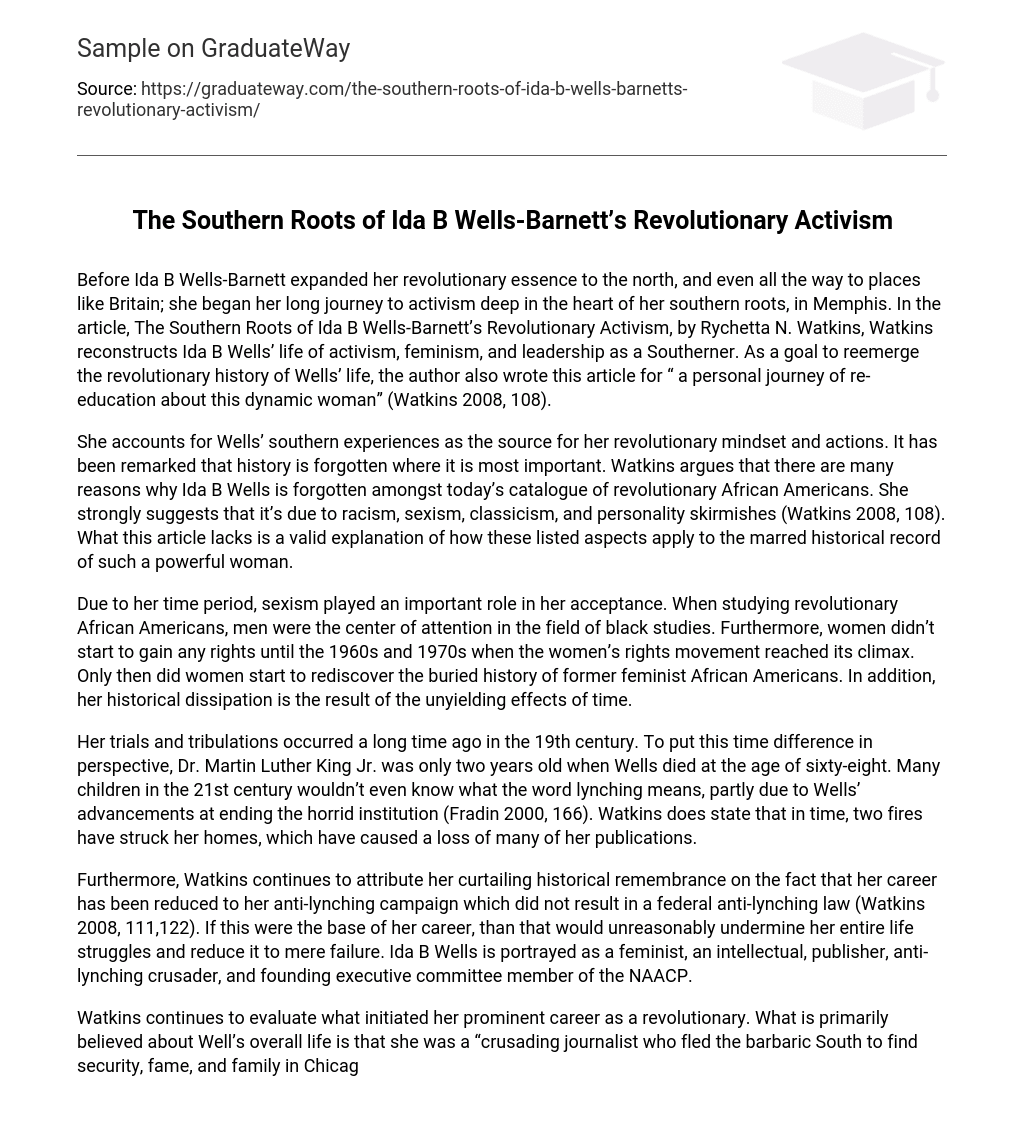Before Ida B Wells-Barnett expanded her revolutionary essence to the north, and even all the way to places like Britain; she began her long journey to activism deep in the heart of her southern roots, in Memphis. In the article, The Southern Roots of Ida B Wells-Barnett’s Revolutionary Activism, by Rychetta N. Watkins, Watkins reconstructs Ida B Wells’ life of activism, feminism, and leadership as a Southerner. As a goal to reemerge the revolutionary history of Wells’ life, the author also wrote this article for “ a personal journey of re-education about this dynamic woman” (Watkins 2008, 108).
She accounts for Wells’ southern experiences as the source for her revolutionary mindset and actions. It has been remarked that history is forgotten where it is most important. Watkins argues that there are many reasons why Ida B Wells is forgotten amongst today’s catalogue of revolutionary African Americans. She strongly suggests that it’s due to racism, sexism, classicism, and personality skirmishes (Watkins 2008, 108). What this article lacks is a valid explanation of how these listed aspects apply to the marred historical record of such a powerful woman.
Due to her time period, sexism played an important role in her acceptance. When studying revolutionary African Americans, men were the center of attention in the field of black studies. Furthermore, women didn’t start to gain any rights until the 1960s and 1970s when the women’s rights movement reached its climax. Only then did women start to rediscover the buried history of former feminist African Americans. In addition, her historical dissipation is the result of the unyielding effects of time.
Her trials and tribulations occurred a long time ago in the 19th century. To put this time difference in perspective, Dr. Martin Luther King Jr. was only two years old when Wells died at the age of sixty-eight. Many children in the 21st century wouldn’t even know what the word lynching means, partly due to Wells’ advancements at ending the horrid institution (Fradin 2000, 166). Watkins does state that in time, two fires have struck her homes, which have caused a loss of many of her publications.
Furthermore, Watkins continues to attribute her curtailing historical remembrance on the fact that her career has been reduced to her anti-lynching campaign which did not result in a federal anti-lynching law (Watkins 2008, 111,122). If this were the base of her career, than that would unreasonably undermine her entire life struggles and reduce it to mere failure. Ida B Wells is portrayed as a feminist, an intellectual, publisher, anti-lynching crusader, and founding executive committee member of the NAACP.
Watkins continues to evaluate what initiated her prominent career as a revolutionary. What is primarily believed about Well’s overall life is that she was a “crusading journalist who fled the barbaric South to find security, fame, and family in Chicago” (Watkins 2008, 111). Contrary to this banal belief, the author of this article believes that Well’s activist career started early at her southern roots and then evolved into a global war with the lynching of three notable businessmen who were also her acquaintances.
With evidence from the primary sources of Ida B Wells, Watkins convincingly supports her argument that this incident only resulted in a deepening expansion of her activist pursuits, not just a beginning to her future. Her fury at the injustices of the southern system is evident before the lynchings began. For example in 1984, she was forcefully ejected from a railcar that she was onboard going from Memphis to Tennessee. Later on she sued and won her case against the railroad company. However, it was overturned due to its denunciation to the “separate but equal” doctrine.
It was this incident that opened her eyes to the unrighteous brutality that rests on all African American shoulders, and sparked her commitment to change (Watkins 2008,115). The author progresses through her article by disagreeing with those who categorize Well’s techniques and ideology as extreme militancy. In support of her extreme militancy is a passage from her autobiography that advocates self-protection with weapons like gun and fighting to win one’s battles. Wells goes on to say that she would be willing to die if taking the life of a lyncher comes along with the package to even things out.
She believed that a rifle should be carried, honorably, in every black household. This is enough evidence to bolster the depiction of Ida B Wells as a militant advocator. In refute, Watkins claims that the post-reconstruction southern society is the reason why a person of color needs to be armed. She illustrates it as a matter of life and death (Watkins 2008, 119). However, this does not effectively subdue her militancy. Her lynching articles are described by many scholars as “the most radical statements made by an African American leader at the time” (Hines 1998, 195).
During this time, she was undeniably becoming more and more noticed for her militant attitude in her writings. She became ostracized by other abolitionists like Booker T Washington for her outspoken nature and blunt writings. When compared to conservative activists like Martin Luther King Jr. or even her compatriot Mary Church Terrell, there is a striking disparity in their approaches to “fight” for freedom (Hines 1998, 196) This article proved to be considerably informative and instrumental in it approach to reconstruct the life of Ida B Wells Barnett and revolve it around her southern experiences.
Environment plays a key role in the development and flourishment of all the distinct revolutionary African Americans during this era. Watkins continued to stress the fact that the remainder of Well’s career was indeed filled with more writing, activism and organizing. Overall, Ida B. Wells was a woman who dramatically altered race relations in our country and should be honored and respected as a phenomenal civil rights activist. By no means should her history ever be forgotten or her influences belittled.





